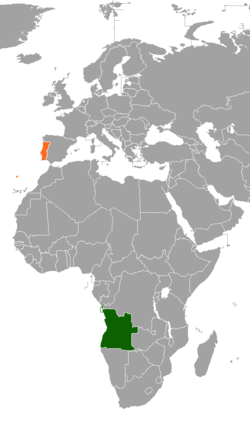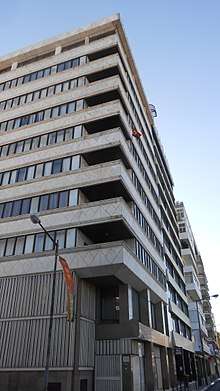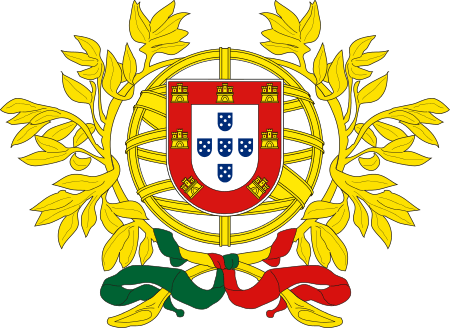Angola–Portugal relations
Angola–Portugal relations have significantly improved since the Angolan government abandoned communism and nominally embraced democracy in 1991, embracing a pro-U.S. and to a lesser degree pro-Europe foreign policy. Portugal ruled Angola for 492 years,[1] colonizing the territory from 1483 until independence in 1975. Angola's war for independence did not end in a military victory for either side, but was suspended as a result of a coup in Portugal, that replaced the Caetano regime with a National Salvation Junta. The Portuguese government recognized the authority of the MPLA, under the command of President Agostinho Neto, on December 22, 1976, and established diplomatic relations on March 10.[2] The MPLA broke off relations with Portugal on May 19 but reestablished official contact on September 3 following a meeting between their Foreign Ministers in Cape Verde.[3] UNITA released a communiqué from Paris on November 13, 1978, detailing an anti-UNITA attack by 20,000 troops from Portugal, Cuba, Katanga, East Germany, and the MPLA. On November 17, 2011, the Portuguese government of Pedro Passos Coelho finalized a loan from the Angolan government of José Eduardo dos Santos to help Portugal deal with its 2010–14 financial crisis.[4] Portugal remains one of Angola's largest trading partners. In 2015, Portuguese exports to Angola amounted to US$2.45 billion and Angolan exports to Portugal totaled US$1.19 billion.
 | |
Angola |
Portugal |
|---|---|
Portugal Financial Crisis
The Great Recession of 2008, had hit the Portugal economy hard. The GDP was falling, unemployment and government debts were high. Cuts needed to be made, cuts in employee wages, lower pension payments, and unemployment benefits. During the financial crisis in Portugal many workers moved to Brazil and Angola, places that spoke Portuguese. Some moved to Britain and Germany for better job opportunities. Many revolts and protests took place when taxes increase and spending was cut[5]
Angolan Government
Executive Branch consists of the chief of state President João Manuel Lourenço (since 26 September 2017), and the Vice President Bornito De Sousa Baltazar Diogo (since 26 September 2017). The executive branch also consists of the head of government the president Joao Manuel Lourenco, and the cabinet which consisted of ministers appointed by the president. Legislative Branch Unicameral National Assembly or Assembleia Nacional (220 seats; members directly elected in a single national constituency and in multi-seat constituencies by closed list proportional representation vote; members serve 5-year terms). The Judicial Branch consists of a Supreme Court or Supremo Tribunal de Justica (which was the court president, vice president, and a minimum of 16-member judges in the court ); Constitutional Court (consists of 11 judges). The Supreme Court judges are appointed by the president with the recommendation of the Supreme Judicial Council.[6]
Angolan Influence in Portugal

The government in Angola had defeated the rebels, and the oil production had doubled the economy became one of the world's fastest growing economies. Portugal which was suffering from the global recession, had made buying large corporations that they would not have been able to afford if Portugal had not been in a crisis an easy picking for the Angolan government. Portugal had also sold some real estate and port wine estates. Angola now had stakes in the Portuguese economy from banking to energy to media.[7]
Resident diplomatic missions
References
- Alker, Hayward R.; Ted Robert Gurr; Kumar Rupesinghe (2001). Journeys Through Conflict: Narratives and Lessons. p. 204.
- Ziliotto, Verónica M. "Republic of Angola".
- aKalley, Jacqueline A.; Elna Schoeman (1999). Southern African Political History: A Chronology of Key Political Events from Independence to Mid-1997. pp. 2–5.
- Portugal indebted to Angola after economic reversal of fortune
- Minder, Raphael (2014-05-05). "Bailout Is Over for Portugal, but Side Effects Will Linger". The New York Times. ISSN 0362-4331. Retrieved 2018-12-05.
- "Africa :: Angola — The World Factbook - Central Intelligence Agency". www.cia.gov. Retrieved 2018-12-05.
- Oliveira, Ricardo Soares de (2015-10-02). "Cash-rich Angola comes to cash-strapped Portugal". POLITICO. Retrieved 2018-12-05.
